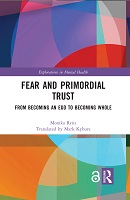Fear and Primordial Trust
Proposal review
From Becoming an Ego to Becoming Whole
Abstract
Fear and Primordial Trust explores fear as an existential phenomenon and how it can be overcome. Illustrated by clinical examples from the author’s practice as a psychotherapist and spiritual caregiver working with the severely ill and dying, the book outline theoretical insights into how primordial trust and archaic fear unconsciously shape our personality and behavior. This book discusses in detail how in our everyday world, we lack primordial trust. Nevertheless, all of us have internalized it: as experiences of another nondual world, of being unconditionally accepted, then sheltered and nurtured. The book outlines how from a spiritual viewpoint, we come from the non-dual world and experience a transition by becoming an ego, thereby experiencing archaic fear. This book explains fear in terms of two challenges encountered in this transition: firstly, leaving the non-world world when everything changes and we feel forlorn. Secondly, on awakening in the ego when we feel dependent and overwhelmed by otherness. The book also helps readers to understand trust as the emotional and spiritual foundation of the human soul, as well as how fear shapes us and how it can be outgrown. The book makes the case that understanding fear and primordial trust improves care and helps us to better understand dying. It will be of interest to academics, scholars and students in the fields of psychiatry, counselling, psychotherapy, and palliative care and to all those interested in understanding fear, trust, and the healing potential of spiritual experiences.

